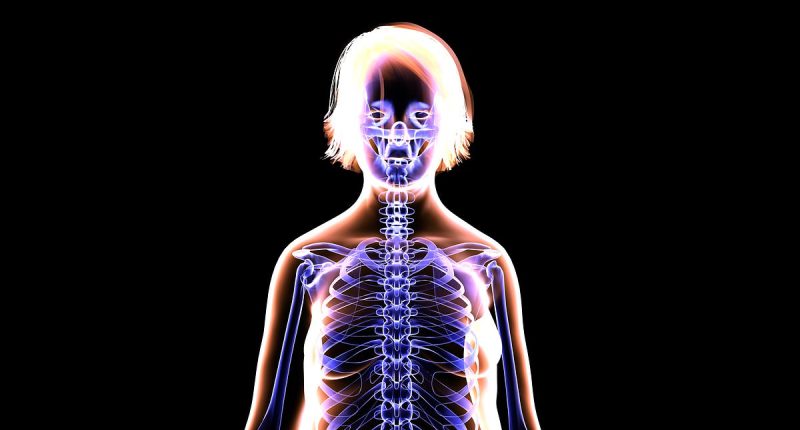Share this @internewscast.com
More than 1.5 million people in the UK now use the new weight-loss jabs, according to latest estimates – with benefits for their physical and mental wellbeing.
Indeed, people with diabetes who took the drugs (known as GLP-1 agonists) had a lower risk of developing 42 diseases including a 22 per cent lower risk of a cardiac arrest, according a recent study in Nature Medicine.
But that’s not the whole story. Concerns are growing about the side-effects – two weeks ago, the Medicines & Healthcare products Regulatory Agency (MHRA) reported a rising number of cases of acute pancreatitis (inflammation of the pancreas) in the UK, which – although rare – is potentially lethal.
In fact, GLP-1 medications are linked to as many as 20 negative health outcomes, according to a recent study led by Professor Ziyad Al-Aly, director of clinical epidemiology at the VA St Louis Health Care System in the US. These range from sudden fainting to kidney problems and arthritic disorders, the journal Nature reported.
Although most people reported mild to moderate symptoms, in some cases these were severe.
Professor Al-Aly says he wasn’t surprised by the range of effects: ‘GLP-1 receptors are present all around the body – including the brain.
‘The drug leads to profound weight loss, and, as well as fat, people lose bone and muscle mass – and may become deficient in micronutrients. This may explain the broad side-effect profile.’
‘But for some people living with massive obesity, the benefit of weight loss and improved cardiovascular risk will outweigh the risks,’ he adds.

Concerns are growing about the side-effects of fat jabs, including a rising number of cases of acute pancreatitis (inflammation of the pancreas) in the UK, which – although rare – is potentially lethal

More than 1.5 million people in the UK now use the new weight-loss jabs, according to latest estimates

Professor Al-Aly says he wasn’t surprised by the range of effects: ‘GLP-1 receptors are present all around the body – including the brain’
‘However, for others who may not need to be on GLP-1 drugs – including people who take it to look good on the red carpet – the risks may not be justified.’
More research is needed on the long-term risks of taking these medications for weight loss, adds Ahmed Ahmed, a consultant bariatric surgeon and president of the British Obesity and Metabolic Specialist Society.
‘GLP-1 medications are useful for weight loss, but they are quite new for this indication [unlike for diabetes, for which they were developed] and the long-term side-effects of taking them in this way remain to be seen.’
He points out that many people regain all the weight once they come off the drugs, which has its own health implications.
Professor Al-Aly agrees: ‘We need to know a lot more.’
Here, experts reveal what we currently know about how the drugs might harm the body…
MUSCLE AND BONE LOSS
It’s estimated that a third of the weight loss from the jabs is muscle and bone.
This may be because muscle proteins are broken down faster than they can be built, due to a reduction in nutrient intake.

Sammy Margo, a physiotherapist based in London, says the older you are, the more likely you are to lose muscle and bone as you lose the pounds as you’re continually losing muscle anyway after 50

Rapid weight loss can lead to sagginess and looking more aged and as the skin sags, existing wrinkles may be accentuated

Mervyn Druian, a dentist at the London Centre for Cosmetic Dentistry, says repeated vomiting, which can be a side-effect of weight-loss jabs, can damage the teeth, as ‘stomach acid erodes the enamel’
This reduction in muscle power has a knock-on effect on bone.
Bones need physical stress to encourage new bone formation to replace old bone cells, explains Sammy Margo, a physiotherapist based in London.
‘The reduction in muscle power – and at the same time, the drop in body weight – means less force is exerted on them.’
The older you are, the more likely you are to lose muscle and bone as you lose the pounds as you’re continually losing muscle anyway after 50, she adds.
The good news is exercise can prevent this.
‘Activities that put stress on bones stimulate extra calcium deposits and encourage bone-forming cells into action –resistance training such as squats or using resistance bands, and weight-bearing exercise such as brisk walking, are essential if you’re using these medications.’
WEAK PELVIC FLOOR
‘Ozempic vagina’ is rapidly becoming a popular hashtag on social media. It refers to the visible sagging of the labia or vagina, caused by rapid weight loss.
‘Ozempic vagina is not a medical diagnosis, but some people use it to refer to vulvovaginal changes while on a GLP-1 agonist,’ Dr Sherry Ross, an associate professor of urology at the University of North Carolina, told Good Health.
‘Rapid weight loss on any body part can affect the skin over the fatty tissue lost – including the lower belly, mons pubis, and inner and outer labia.’
It can affect all ages, although older women whose skin has already lost elasticity are more prone to it, she says.
Rapid weight loss can also cause the widespread loss of muscle mass, including the muscles that support the pelvic floor, adds Dr Ross, the author of She-ology: The Definitive Guide To Women’s Intimate Health. Period.
This raises the risk of a prolapse, urinary incontinence, and faecal and gas incontinence.
‘Having any, or all, of these uncomfortable and embarrassing symptoms, can have a negative effect on sexual desire,’ says Dr Ross – though, she adds, overall, weight loss may boost desire.
Sammy Margo’s advice is for ‘women to proactively strengthen their pelvic floor during rapid weight-loss periods’ with pelvic floor exercises.
DEPRESSION
While there’s good evidence, certainly in people with diabetes, that GLP-1 drugs can reduce symptoms of depression (the exact mechanism isn’t clear), a major study published in Nature last year suggested that the drugs may be linked to an increased risk of psychiatric disorders.
Analysis of studies involving more than 162,000 people taking GLP-1s found a 195 per cent higher risk of depression, a 108 per cent increased risk for anxiety and 106 per cent increased risk for suicidal behaviour.
The authors wrote: ‘These findings underscore the critical need for physicians to thoroughly assess patient history’ before prescribing the drugs.
PANCREATITIS
Recent reports have linked the weight-loss jabs to acute pancreatitis, which may be due to the drugs overstimulating the exocrine duct cells in the pancreas to produce more digestive juices – these can back up, leading to inflammation.
‘Pancreatic inflammation is dangerous because the inflammatory process can cause complications such as cell death in the pancreas itself, potentially leading to sepsis and even death,’ Dr Christian Macutkiewicz, a consultant general and hepato-pancreatico-biliary surgeon at Manchester Royal Infirmary, told Good Health.
‘However, most cases are mild and self-limiting,’ he says, adding that there is no evidence at the moment that one GLP-1 drug is worse than the other.
‘Rarely, people who use weight-loss jabs can develop gallstones. While these don’t usually cause symptoms, they can block the pancreatic duct, which can lead to inflammation of the pancreas.’
WRINKLES
Rapid weight loss can lead to sagginess and looking more aged.
But ‘Ozempic face’, as it’s known, can occur with rapid weight loss from any cause, says Omar Quaba, a consultant plastic surgeon based in Edinburgh.
‘The facial changes result from rapid fat loss in fat pads, leading to sunken cheeks, eyes, and temples, and making the bones of the face appear more prominent.’
As the skin sags, existing wrinkles may be accentuated – the folds around the nose can become more prominent, too, while the skin around the jawline becomes looser.
The effect is more pronounced in people with naturally leaner faces, or older adults with lower collagen levels, says Dr Quaba.
Menopausal and post-menopausal women are particularly vulnerable as almost a third of skin collagen is lost during the first five years after menopause.
Fat loss in the face can be permanent, adds Dr Justine Hextall, a consultant dermatologist at the Tarrant Street Clinic in Sussex.
To minimise skin sagging, ensure weight loss is steady, around 0.5kg per week, suggests Dr Hextall.
‘Ensure that a healthy, balanced diet is in place – with adequate nutrients, including protein.’
And make sure skin is protected against UV and pollution, as ‘these will contribute to loss of collagen and skin ageing’.
She adds: ‘Restoring volume with dermal fillers or fat transfer will help and then, if necessary, individuals might want to consider surgery to lift skin and deeper tissues.’
Dr Quaba reports seeing an increase in patients seeking surgery for loose skin on their breasts, tummy and arms after significant, rapid weight loss.
HAIR LOSS
The stress of rapid weight loss on your body can lead to temporary shedding of hair, a condition known as telogen effluvium.
As Stephen Carson, a trichologist based in North London, told Good Health: ‘Any major change causing physical, emotional, nutritional and hormonal stress on the body can have this effect.
‘However, this is not permanent, and once the stressor has been removed [i.e. stopping GLP-1s], normal hair growth will resume.’
Another form of hair loss he’s seen in some people taking the jabs is alopecia areata, where the immune system attacks hair follicles causing bald patches.
‘But again, I suspect that this was caused by the sudden shock of the weight loss,’ says Mr Carson. ‘Alopecia areata can resolve fully, but it depends on the individual.
‘To look after your hair while on these jabs, lose weight gradually, and make sure you consume lots of protein, vegetables, oily fish or flax seed oil, legumes and nuts, which all contribute to a healthy scalp,’ he says. ‘And make sure you’re well-hydrated.’
GUT PROBLEMS
Nausea is the most common gastrointestinal side-effect linked to GLP-1 drugs, with up to 50 per cent of people affected. Nausea is often worse when starting on the jabs, or when the dose is raised.
Mr Ahmed says one theory is that this is probably down to how GLP-1 receptors work on the brain – specifically, an area called the postrema, which plays a crucial role in regulating nausea, vomiting and blood pressure.
Diarrhoea is the second most common gastrointestinal side-effect, although it’s typically mild and short term.
The GLP-1 drugs delay gastric emptying, affecting how long food stays in the stomach and intestines.
But in some people this may initially trigger this process to speed up, says Mr Ahmed. ‘Vomiting can also occur due to the impact of the drugs on stomach emptying.’
Constipation is another common side-effect. ‘Food stays in the stomach and gut for longer, leading to harder stools and difficulty passing them’, says Mr Ahmed.
In rare cases, constipation can lead to complications, such as painful tears in the anus and piles.
‘Ways to reduce this problem include staying hydrated to soften stools, and eating a high-fibre diet to bulk out stools and make them easier to pass,’ says Mr Ahmed.
‘Regular physical activity can help stimulate the digestive system and promote regular bowel movements.’
TOOTH DAMAGE
While not a proven side-effect, there have been anecdotal reports of poorer oral health or ‘Ozempic teeth’ – characterised by a dry mouth, bad breath and tooth damage – possibly because the drugs cause an environment that hastens tooth decay.
Repeated vomiting (see above) could also damage the teeth, as ‘stomach acid erodes the enamel’, explains Mervyn Druian, a dentist at the London Centre for Cosmetic Dentistry.
‘People using these medications should stay well-hydrated and sip water throughout the day.’













